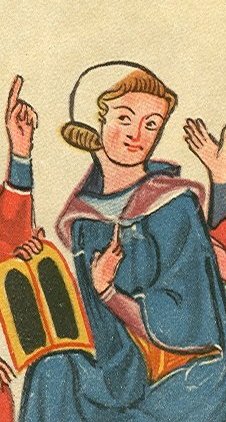

Modesty
I find myself now in doubt as to these lives, father and son. Shall someone come and ask us --since between age and youth there's rarely much agreement, the young disregarding possessions, while the old prize them-- how then the two of them could ever so compromise that each one separately should find satisfaction and exercise his rights, Rual thus retaining wealth in moderation and Tristan pursuing ambition in full hope of attaining it? I can solve this, truthfully: Rual and Tristan held for each other a respect so consistent that neither would press upon the other a pro or con at variance with what the other wanted. Rual knew virtue when he saw it and therefore wholly trusted Tristan, taking his youth in consideration. And Tristan, in his turn, deferred to Rual's wisdom. They had such common will and so strove for a common goal that what one wanted, so did the other. And so between the two of them, in will and spirit they were as one. And thus it was that age and youth agreed upon a single virtue. High spirits yielded to good sense, so that in concord with one another, Tristan might strive for valor, Rual for respectable wealth, while each of them in this venture fully exercised his rights.
Thus Tristan and Rual began to manage their immediate affairs, as the task fell to them. They acquired robes and armor 4550 over the next thirty days, to properly equip thirty knights whom Tristan, following courtly custom, intended to sponsor as companions. Now, if you ask me what they wore and how elegant their costumes were, and how all this had been collected, it will cost me but little thought just to repeat what the legend tells. If I invent some other story, then anyone can contrive one better, and tell it just as he may prefer. Their raiment all accorded to four different kinds of richness, and of these four, each had in turn its proper rich office. The first of them was high spirits. Then came impressive possessions. Following these came circumspection, which knits the former two together. The last was knowing courtly custom, which harmonized the other three. These four each took effect according to their nature: high spirits strove, rich possessions granted, circumspection worked and cut, custom sewed their clothes together and their other finery, caparisons and pennants, and all the other equipment that distinguishes a knight. Whatever adorns horse or man and marks the rank of chivalry, their equipment was as fine and of such thorough opulence as would befit any king for the knighting ceremony. Now that the company is prepared with discriminating richness, how shall I describe the scene so as to ready the candidate, Tristan the worthy, to receive the sword, and make it pleasing to hear while doing the story justice? I hardly know how to put it so as to satisfy and please you and likewise ornament the story. In my day, you know, and before, 4600 there have been fine descriptions of worldly elegance, of opulence on display. If I had twelve full sets of the one cleverness I have and the skill to use them, and could it somehow be that I was blessed with twelve tongues all in my one mouth, of which each was able to speak as well as I can, I still would not know how to begin to compose a description of richness and ceremony that hasn't been surpassed before. The elegance of chivalry has been described so many ways and so often retold to excess that I can hardly mention it and hope to please a single soul.
| Next Episode | Index of Episodes |